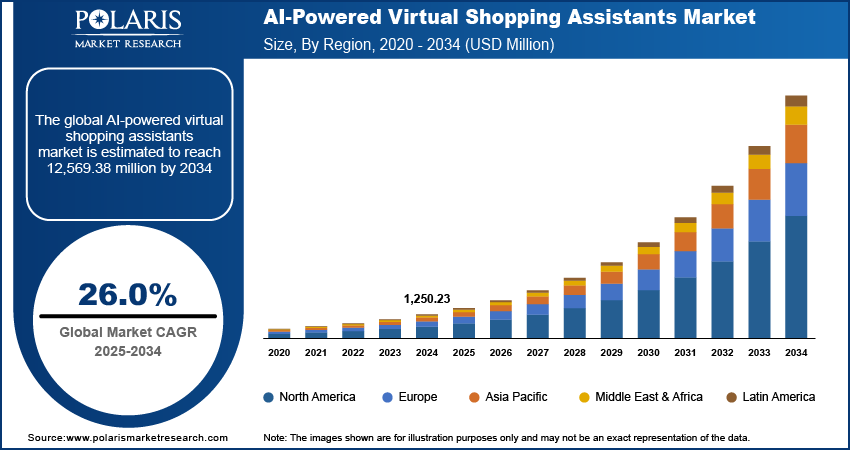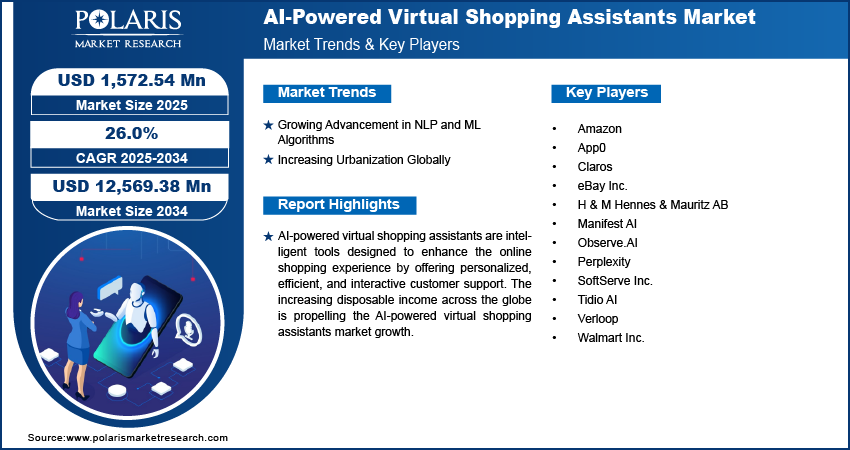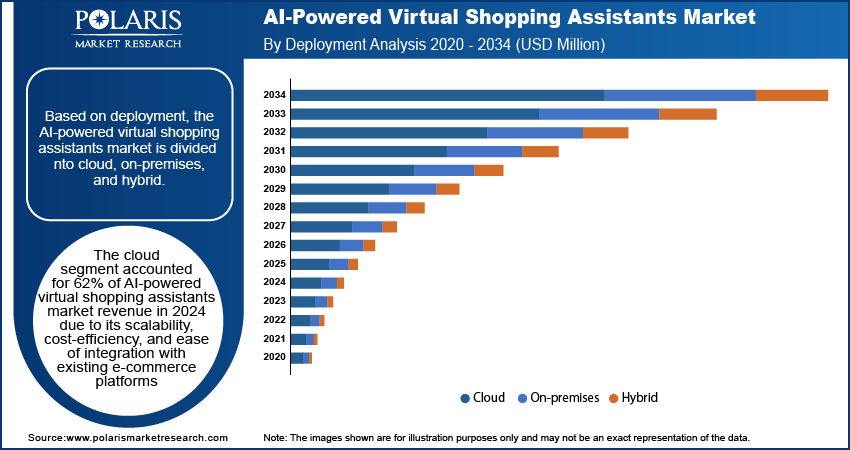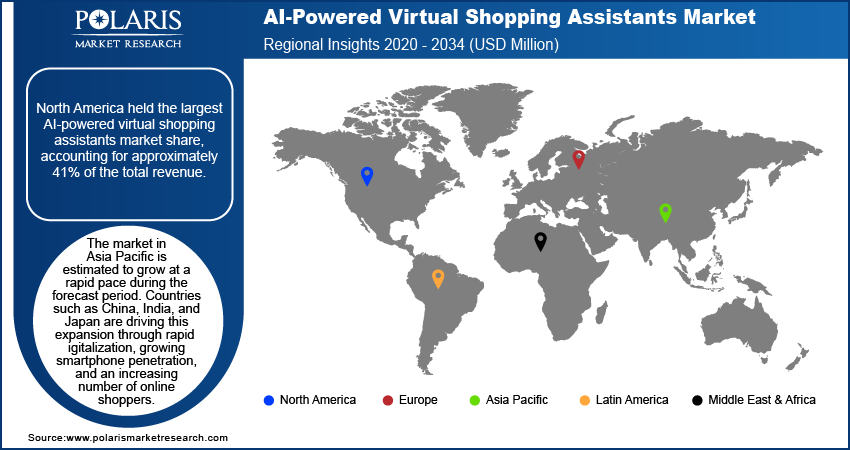
AI-Powered Virtual Shopping Assistants Market Size, Share, Trends, Industry Analysis Report
: By Deployment (Cloud, On-Premises, and Hybrid), Technology, Industry Vertical, and Region (North America, Europe, Asia Pacific, Latin America, and Middle East & Africa) – Market Forecast, 2025-2034
- Published Date:Aug-2025
- Pages: 129
- Format: PDF
- Report ID: PM5596
- Base Year: 2024
- Historical Data: 2020-2023
Market Overview
AI-powered virtual shopping assistants market size was valued at USD 1,250.23 million in 2024, exhibiting a CAGR of 26.0 % during 2025-2034. Rising incomes, digitalization, advanced AI technologies, and growing urban demand for convenient, personalized shopping drive the market.
Key Insights
- The cloud deployment segment dominated with 62% market share in 2024 due to its scalability, cost efficiency, and seamless integration across digital channels.
- The e-commerce vertical led with around 38% revenue share by adopting AI assistants to improve user experience, reduce cart abandonment, and personalize shopping journeys.
- North America held the largest regional share due to early AI adoption, high digital literacy, strong e-commerce ecosystems, and significant investments from major retailers such as Amazon.
- Asia Pacific is growing fast, fueled by rapid digitalization, 5G smartphone penetration, a growing middle class, and rising adoption of AI assistants in e-commerce and customer support.
Industry Dynamics
- Rising disposable incomes drive demand for personalized and convenient AI-powered shopping experiences.
- Growing digitalization fuels expectations for seamless, real-time support and tailored recommendations.
- Advances in NLP and machine learning improve AI assistants’ accuracy and personalization, enhancing user engagement.
- Increasing urbanization expands the market for on-the-go, efficient AI shopping solutions.
- Privacy concerns and high implementation costs may limit the broader adoption of AI-powered virtual shopping assistants.
Market Statistics
2024 Market Size: USD 1,250.23 million
2034 Projected Market Size: USD 12,569.38 million
CAGR (2025–2034): 26.0%
North America: Largest market in 2024
AI Impact on AI-Powered Virtual Shopping Assistants Market
- AI enables highly personalized shopping experiences through real-time data analysis and customer behavior prediction.
- Natural Language Processing (NLP) improves understanding and responsiveness to customer queries, creating more human-like interactions.
- Machine learning algorithms help virtual assistants continuously learn and adapt to user preferences, increasing accuracy and relevance.
- AI-driven automation supports efficient handling of complex tasks such as order tracking, product discovery, and personalized recommendations.
- Integration of AI enhances cross-selling and upselling capabilities, boosting e-commerce sales and customer retention.

To Understand More About this Research: Request a Free Sample Report
AI-powered virtual shopping assistants are intelligent tools designed to enhance the online shopping experience by offering personalized, efficient, and interactive customer support. These assistants leverage technologies such as natural language processing (NLP), machine learning (ML), and data analytics to simulate human-like interactions, helping customers navigate eCommerce platforms effortlessly. AI shopping assistants dynamically adapt to user queries, providing tailored recommendations and solutions based on individual preferences and behaviors. These virtual assistants serve as digital sales associates, guiding shoppers through the buying process with features such as product discovery, order updates, and website navigation assistance. The usage of AI-powered virtual shopping assistants extends beyond basic customer support. They play a crucial role in boosting e-commerce performance by increasing sales through cross-selling and upselling strategies.
The increasing disposable income across the globe is propelling the AI-powered virtual shopping assistants market growth. The Bureau of Economic Analysis (BEA) published a report stating that, in January 2025, US disposable personal income increased by USD 194.3 billion, or 0.9%. Increased disposable income propels people to seek convenient and personalized shopping experiences. AI-powered virtual shopping assistants offer personalized product recommendations, real-time support, and streamlined shopping processes, which align perfectly with the preferences of consumers with higher disposable incomes. Higher disposable income also encourages consumers to experiment with premium services, such as AI-driven styling advice or virtual try-ons. This encourages retailers to adopt and integrate AI-powered virtual shopping assistants to enhance consumers' overall shopping experience. Therefore, the demand for AI-powered virtual shopping assistants is increasing with the rising disposable income across the globe.
The AI-powered virtual shopping assistants market demand is driven by the growing digitalization. Digitalization has fueled consumers to expect seamless, personalized, and efficient shopping experiences. AI-powered virtual shopping assistants meet these expectations by providing real-time support, personalized product recommendations, and quick resolutions to queries, which traditional customer service models often struggle to deliver. Additionally, digitalization generates vast amounts of consumer data, allowing AI assistants to learn preferences, improve accuracy, and boost sales over time. This encourages e-commerce platforms to adopt and integrate AI-powered virtual shopping assistants, contributing to market expansion.
Market Dynamics
Growing Advancement in NLP and ML Algorithms
Improved NLP has enabled AI-powered virtual shopping assistants to understand and respond to customer queries more accurately, providing a seamless and intuitive shopping experience. Machine learning algorithms, on the other hand, allow these assistants to learn from customer interactions, offering personalized recommendations and anticipating customer needs with greater precision. Therefore, as these technologies continue to evolve, they enable AI-powered virtual shopping assistants to handle complex tasks, such as processing natural language queries, understanding context, and even predicting customer behavior. This increased functionality and reliability of advanced AI-powered virtual shopping assistants drive their demand as businesses recognize the potential to improve customer satisfaction, increase sales, and gain a competitive edge.
Increasing Urbanization Globally
Urban people often seek faster, more convenient ways to shop without dealing with crowded stores or limited time. AI-powered virtual shopping assistants offer a solution by providing personalized recommendations, instant support, and easy access to products from any location, thereby encouraging their adoption. According to data published by the World Economic Forum, the share of the world’s population living in cities is expected to rise to 80% by 2050 from 55% in 2022. Retailers in urban markets also invest heavily in AI tools to attract tech-savvy customers and differentiate themselves in a competitive market. Hence, as urbanization continues, the demand for intelligent, on-the-go shopping solutions grows, establishing AI-powered virtual assistants as essential tools for modern urban consumers.

Segment Insights
Market Evaluation by Deployment
Based on deployment, the AI-powered virtual shopping assistants market is divided into cloud, on-premises, and hybrid. The cloud segment accounted for 62% of AI-powered virtual shopping assistants market revenue share in 2024 due to its scalability, cost-efficiency, and ease of integration with existing e-commerce platforms. The cloud infrastructure enabled retailers to deploy intelligent shopping assistants across multiple digital touchpoints such as websites, mobile apps, and messaging platforms without heavy upfront investments in IT infrastructure. Additionally, cloud deployment allowed real-time data synchronization and updates, which helped enhance personalization and responsiveness in customer interactions. These capabilities significantly improved the user experience, leading to higher customer satisfaction and increased sales conversions, thereby driving the dominance of the segment.
Market Assessment by Industry Vertical
The AI-powered virtual shopping assistants market segmentation, based on industry vertical, includes e-commerce, retail, consumer goods, electronics, automotive, healthcare, and others. The e-commerce segment led the market with ~ 38% revenue share. E-commerce businesses are aggressively adopting intelligent shopping technologies to enhance user experience, increase conversion rates, and reduce cart abandonment. The highly competitive nature of digital commerce forced companies to personalize customer journeys using advanced AI tools that recommend products, offer real-time assistance, and streamline the decision-making process. Additionally, the shift in consumer behavior toward mobile and digital shopping created a favorable environment for deploying AI-powered virtual shopping assistants capable of engaging customers across various channels.
In the coming years, the retail segment is projected to grow at a rapid pace, driven by the integration of artificial intelligence into physical stores and omnichannel retail strategies. Retailers are increasingly leveraging AI technologies to offer in-store digital assistants, personalized promotions, and voice-activated kiosks that replicate the convenience of online shopping. The convergence of physical and digital retail experiences allows businesses to gather deeper insights into customer behavior and tailor offerings in real-time. Moreover, rising consumer expectations for seamless, tech-enabled interactions and the retail sector’s investments in digital transformation are estimated to propel the segment's growth.

Regional Analysis
By region, the study provides AI-powered virtual shopping assistants market insights into North America, Europe, Asia Pacific, Latin America, and the Middle East & Africa. North America held the largest AI-powered virtual shopping assistants market share, accounting for approximately 41% of the total revenue. The region benefited from the early adoption of advanced AI technologies, high digital literacy, and a well-established e-commerce ecosystem. Major retailers and tech companies across the US, such as Amazon, have heavily invested in AI-powered intelligent shopping solutions to improve customer engagement and drive sales. The high penetration of smartphones and growing investment in research and development in information and technology contributed to the market dominance in the region.
The AI-powered virtual shopping assistants market in Asia Pacific is estimated to grow at a rapid pace during the forecast period. Countries such as China, India, and Japan are driving this expansion through rapid digitalization, growing 5G smartphone penetration, and an increasing number of online shoppers. Retailers in the region are adopting AI-powered intelligent assistants to meet rising consumer expectations for convenience, speed, and personalization. Additionally, India’s growing IT sector and the increasing use of AI-powered enterprise automation in customer support and financial services are contributing to the region’s rising market share. According to the National Association of Software and Service Companies (NASSCOM), the Indian IT industry’s revenue touched US$ 227 billion in FY22, a 15.5% YoY growth. The region’s large population base, coupled with the growing middle class and increased investments in AI infrastructure, also positions Asia Pacific to emerge as the major region in the coming years.

AI-Powered Virtual Shopping Assistants Key Market Players & Competitive Analysis Report
The AI-powered virtual shopping assistants market opportunity is constantly evolving, with numerous companies striving to innovate and distinguish themselves. Major global companies dominate the market by leveraging extensive research and development and advanced techniques. These companies pursue strategic initiatives such as mergers, acquisitions, partnerships, and collaborations to enhance their product portfolio offerings and expand into new markets.
The AI-powered virtual shopping assistants market is fragmented, with the presence of numerous global and regional players. Major players in the market are Amazon, App0, Claros, eBay Inc., H&M Hennes & Mauritz AB, Manifest AI, Observe.AI, Perplexity, SoftServe Inc., Tidio AI, Verloop, and Walmart Inc.
Manifest AI is an innovative platform revolutionizing eCommerce with its advanced AI-powered virtual shopping assistant. Designed specifically for eCommerce storefronts, including Shopify stores, Manifest AI aims to enhance customer experiences by offering personalized, interactive shopping journeys. Manifest AI platform acts as a digital sales associate, leveraging natural language processing (NLP) and deep learning algorithms to understand customer preferences, recommend products, and assist throughout the purchasing process. The company’s platform integrates seamlessly with tools such as ChatGPT and requires minimal setup effort. Once deployed, it automates various processes while maintaining flexibility for customization.
SoftServe Inc. is a global company in IT consulting and digital services known for its expertise in delivering innovative solutions across various industries. Founded in 1993, the company has established a global presence with offices in multiple countries. Headquartered in Austin, Texas, SoftServe specializes in empowering enterprises and software companies to achieve digital transformation, accelerate solution development, and optimize business operations through advanced technologies. The SoftServe Gen AI Retail Shopping Assistant empowers shoppers to make confident purchasing decisions through features such as interactive virtual try-ons. This allows users to visualize products in real-time, ensuring they can assess the fit and style before committing to a purchase.
Key Companies
- Amazon
- App0
- Claros
- eBay Inc.
- H & M Hennes & Mauritz AB
- Manifest AI
- Observe.AI
- Perplexity
- SoftServe Inc.
- Tidio AI
- Verloop
- Walmart Inc.
AI-Powered Virtual Shopping Assistants Industry Developments
January 2025: SoftServe, a premier IT consulting and digital services provider, announced the launch of SoftServe Gen AI Retail Shopping Assistant at NRF 2025 to enhance the retail experience.
November 2024: Amazon announced the launch of Rufus, a generative AI-powered conversational shopping assistant, in beta across Europe.
November 2024: Perplexity, an AI-powered search engine, introduced an AI-powered shopping assistant for perplexity pro users in the US.
AI-Powered Virtual Shopping Assistants Market Segmentation
By Deployment Outlook (Revenue, USD Million, 2020-2034)
- Cloud
- On-Premises
- Hybrid
By Technology Outlook (Revenue, USD Million, 2020-2034)
- Natural Language Processing (NLP)
- Machine Learning (ML) & Deep Learning
- Voice Recognition
- Others
By Industry Vertical Outlook (Revenue, USD Million, 2020-2034)
- E-Commerce
- Retail
- Consumer Goods
- Electronics
- Automotive
- Healthcare
- Others
By Regional Outlook (Revenue, USD Million, 2020-2034)
- North America
- US
- Canada
- Europe
- Germany
- France
- UK
- Italy
- Spain
- Netherlands
- Russia
- Rest of Europe
- Asia Pacific
- China
- Japan
- India
- Malaysia
- South Korea
- Indonesia
- Australia
- Vietnam
- Rest of Asia Pacific
- Middle East & Africa
- Saudi Arabia
- UAE
- Israel
- South Africa
- Rest of Middle East & Africa
- Latin America
- Mexico
- Brazil
- Argentina
- Rest of Latin America
Report Scope
|
Report Attributes |
Details |
|
Market Size Value in 2024 |
USD 1,250.23 Million |
|
Market Size Value in 2025 |
USD 1,572.54 Million |
|
Revenue Forecast in 2034 |
USD 12,569.38 Million |
|
CAGR |
26.0% from 2025 to 2034 |
|
Base Year |
2024 |
|
Historical Data |
2020– 2023 |
|
Forecast Period |
2025 – 2034 |
|
Quantitative Units |
Revenue in USD Million and CAGR from 2025 to 2034 |
|
Report Coverage |
Revenue Forecast, Market Competitive Landscape, Growth Factors, and Industry Trends |
|
Segments Covered |
|
|
Regional Scope |
|
|
Competitive Landscape |
|
|
Report Format |
|
|
Customization |
Report customization as per your requirements with respect to countries, regions, and segmentation. |
FAQ's
The global AI-powered virtual shopping assistants market size was valued at USD 1,250.23 million in 2024 and is projected to grow to USD 12,569.38 million by 2034.
The global market is projected to register a CAGR of 26.0% during the forecast period.
North America had the largest share of the global market in 2024.
Some of the key players in the market are Amazon, App0, Claros, eBay Inc., H&M Hennes & Mauritz AB, Manifest AI, Observe.AI, Perplexity, SoftServe Inc., Tidio AI, Verloop, and Walmart Inc.
The cloud segment dominated the AI-powered virtual shopping assistants market revenue share in 2024.
The retail segment is expected to grow at the fastest pace in the coming years.
